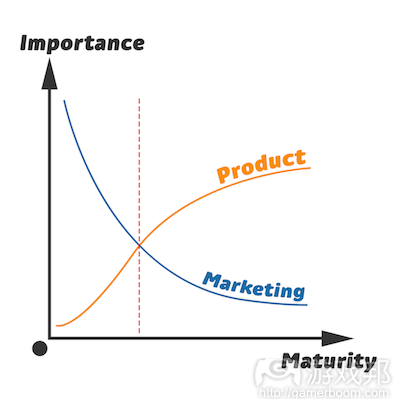分析游戏平台生命周期的发展特点
作者:Jan Beckers
重心从营销转向产品
在之前的文章中,我们已经讨论过游戏平台在许多方面类似于国家这种概念。这两种实体都有特定的规则和制度,发展和没落周期,竞争和税收。我们认为与国家和社会一样,游戏平台的发展模式也呈现出这些特点。
无论是哪个平台,都回避不了一个基本而重要的问题:“如何分配我的预算?”随着平台周期中成功因素的不断变化,这个问题的答案也不尽相同。这里存在一个明显的模式。
早期平台营销第一,成熟平台产品为王
在平台发展早期,人们对平台特定情况知之甚少。用户和消费者多数不了解与平台相关的情况。新技术进入市场总会瞬间产生一种信息短缺。用户必须适应平台。最初的市场没有太多媒体资源,好友之间的口碑传播也需要一定时间才能成型。因此,平台初期的检索机制和筛选功能力量甚为薄弱。
这种信息短缺现象也会延伸到平台所供应的产品,即我们所说的游戏。在社交网络发展初期,在Facebook平台上挑选游戏的用户好比是初到某个国家的游客,在没有旅行向导的情况下,茫然不知该选择哪家餐厅就餐。
潜在用户要依靠营销来制定自己的决策。Zynga所掌握的优势使其深谙此道,该公司成功营销推广了无数的“Ville”游戏(这些游戏之间相差无几)。他们早期在营销上的投入得以让公司在社交游戏市场占据重要地位。
新平台的圈地运动
但影响用户制定决策的因素也在随时间发展发生巨大变化。随着一个新生态圈的发展,人们可获知的信息源也在随之增加。用户逐渐与行业中的公司重复打交道。用户不但可以获得自己所需的信息,还可以根据自己积极的经验和教训来帮助自己挑选游戏。
成熟平台拥有理性用户
成熟平台拥有已经玩过许多游戏、经验丰富的用户。他们知道游戏所有者的声誉,并且能够轻易鉴别出游戏的好坏。在此,品牌和专营权更为重要。即使用户缺乏经验,媒体(游戏邦注:包括游戏杂志、网站、博客和论坛等)也可以提供大量参考信息,提供筛选和检索工具。好友们会在Facebook或酒吧聚会时讨论社交游戏。用户现在可以根据产品质量而做出理性的选择。Supercell和Kingm.com等公司就是这种情况的赢家。这两者都高度重视游戏质量,正如Supercell首席执行官Ilkka Paananen在最近采访中所言“现在产品质量和产品本身更为重要。”
最佳产品会在成熟平台胜出
总之,开发商和发行商若要取得成功,就必须跟随平台自然发展的潮流。在平台处于稚嫩时期要关注营销策略,并利用早期积累的成功要素和用户基础来打造最佳产品。(本文为游戏邦/gamerboom.com编译,拒绝任何不保留版权的转载,如需转载请联系:游戏邦)
Guest Post: Learning from the past: Patterns in the recent history of game platforms part 2
Jan Beckers
Editor’s note: Today’s guest post comes to us from Jan Beckers, co-founder and CEO of HitFox, an incubator focused on investing in and acquiring game distribution and user acquisition startups. This article is the second in a five-part series of articles analyzing game platforms and the patterns that historically repeat itself.
Part 2: From marketing to product focus
In the first party of this article series, we discovered how gaming platforms are very similar to countries in many ways. Both types of entities have specific rules and regulations, growth and decline cycles, competition and taxes. We saw that just like countries and societies, game platforms show patterns in the development of these features. We then took a closer look at the first of these crucial patterns, the acceleration of platform cycles.
A question that is equally elemental as it is crucial, regardless of platform is: “How do I distribute my budgets?” This question is dynamic as the crucial success factors change with the platform cycle. And there is one pattern here in that stands out strong.
Pattern 2: Marketing wins on early platforms, product wins on mature platforms
In the early days of a platform, specific knowledge was rare. Consumers and users are largely uninformed and don’t truly understand or relate to the platform. With a new technology entering the market there is an instantaneous shortage of information. The customer has to get used to a platform. At the beginning there won’t be many media resources. Word of mouth recommendations by friends also need time to build up. In consequence, discovery mechanisms and filtering functions are weak at the outset of a platform.
The shortage of information extends to the products offered for a platform and in our context the games. A user that wanted to pick a game on Facebook in the early days of the social network was like a tourist that just arrived in a new country, trying to decide on which restaurant to pick — without a travel guide.
The potential customer has to rely on marketing in order to make his decisions. Zynga was masterful in using this situation for their advantage. The company successfully focused on marketing with numerous “Ville” titles, which are only marginally different. Their early emphasis on marketing helped to establish them as a crucial player in the social games market.
Marketing wins on a new platform. It’s a land grab.
This foundation for decision making changes significantly over time though. With the development of a new ecosystem, the number of available information sources increases. And over time, the consumers have repeated interactions with businesses. Not only can the customer access information at his or her will, accumulated lessons and experiences are now part of the decision making process.
Mature platforms have educated users.
Mature platforms have experienced users that have played many games. They know the owners reputation and they can more easily differentiate between good and bad games. Brands and franchises become more important. Even if the user lacks experience, the media, e.g. game magazines, websites, blogs and forums deliver plenty of information, providing tools for both filtering and discovery. And friends discuss the games on Facebook or over drinks at the bar. The user can now make educated decisions based on product quality. The first consequences can be seen in the mobile market now with players like Supercell and King.com. Both are hugely successful with a focus on top-quality. “Now it’s a lot more about the product quality and the product itself,” as Supercell CEO Ilkka Paananen stated in a recent interview.
The best product wins on mature platforms.Jan Beckers Inside Mobile Apps guest post 2 graph
To sum up: In order to be as successful as possible, developers and publishers have to go with the natural platform flow. They need to concentrate on marketing when a platform is young and then use the early success and the user base to build the best product over time.(source:insidemobileapps)








































 闽公网安备35020302001549号
闽公网安备35020302001549号